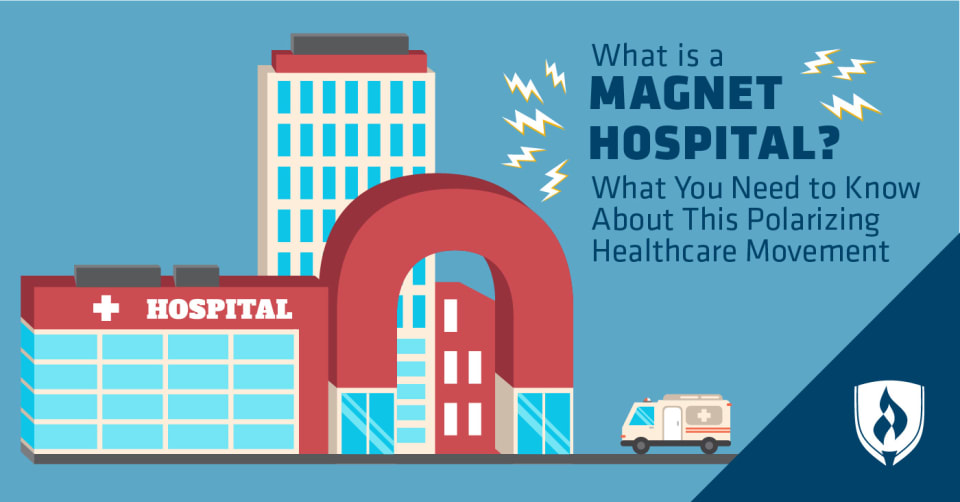What Is a Magnet Hospital? What You Need to Know About This Polarizing Healthcare Designation
By Ashley Abramson on 05/22/2017

It takes a large team of clinical and administrative professionals to successfully operate a healthcare facility. But when it comes to directly working with patients, nurses are on the front line.
Whether in clinics, hospitals or other facilities, nursing professionals are at the forefront of providing quality care for patients—so it’s important they feel empowered and equipped for success in their work environment. Basically, the ability of nurses to perform their jobs well affects the wellbeing of their entire organization.
One way healthcare facilities can draw in and keep excellent nursing professionals is by acquiring the status of a “Magnet hospital.” This is achieved by meeting a lengthy series of credentialing requirements through the Magnet Recognition Program.
But what is a Magnet hospital and what are the benefits of becoming one? Join us as we look closer at this hot topic in healthcare.
What is a Magnet hospital, anyway?
Developed by the American Nurses Credentialing Center (ANCC), the Magnet hospital program gives healthcare organizations the opportunity to meet standards of excellence in 35 areas related to the quality of care they offer. Magnet credentialing is guided by principles in excellence and professionalism that ultimately advance three goals within hospitals:
- Promoting quality in a setting that supports professional practice
- Identifying excellence in the delivery of nursing service to patients or residents
- Disseminating best practices in nurse services
Due to its ability to “magnetically” attract and retain highly-qualified professional nurses, the Magnet hospital designation increases excellence for the hospital, its nursing team and, in turn, its patients.
Benefits of being a Magnet hospital
According to the ANCC, Magnet status offers a number of benefits to hospitals. These benefits include an improved ability to attract top talent, improving patient care, safety and satisfaction, fostering a collaborative culture, advancing nursing standards of practice and growing business and financial success.
Because of its highly competitive and detailed application process, only six percent of American hospitals have earned Magnet status. But according to the ANCC, even the process of credentialing, or the “Journey to Magnet Excellence,” can be a helpful assessment tool for hospitals:
“The process of applying for Magnet designation is thorough and lengthy, demanding widespread participation within the organization. Healthcare organizations find the journey to be a revealing self-assessment, creating opportunity for organizational advancement, team building and enhancement of individual professional self-esteem.”
The ANCC describes Magnet designation as a trickle-down effect that ensures excellence hospital-wide and therefore benefits nurses, their patients and even other hospital employees or departments.
“Magnet designation impacts the organization in countless ways. Everything from pride among nurses to innovation and collaboration flourishes. These improvements impact not only nursing but all hospital departments,” according to the ANCC.
How does it benefit nurses?
Of course, though Magnet designation sets apart hospitals as a whole, there are a number of specific perks for the nurses who are employed at them.
Nurses in Magnet healthcare facilities are shown to have higher levels of job satisfaction and lower turnover rates, according to Dr. Colleen Koob, Dean of Online Nursing at Rasmussen University.
A 2011 study showed Magnet hospitals have “better work environments, a more highly-educated nursing workforce, superior nurse-to-patient staffing ratios and higher nurse satisfaction than non-Magnet hospitals.”
Aubrey Richardson, an RN at NYU Langone Hospital, a Magnet-credentialed hospital in New York City, said her work environment is more positive for several reasons.
“I enjoy working here because Magnet ensures a safe patient ratio,” Richardson says. “On the postpartum floor where I work, we have three mother-baby sets to one nurse. This is a lot higher at other NYC hospitals.”
Richardson also values the education opportunities offered by Magnet credentialing, which she believes helps nurses work more confidently and successfully.
“Magnet condones residency programs for new nurses to transition onto the hospital floor environment and feel supported,” Richardson says.
In addition to on-boarding education, existing nurses can also participate in preceptorship programs lasting 8–10 weeks to ensure they have the knowledge necessary to continually do their jobs well.
How does it benefit patients?
Because status as a Magnet hospital brings in the most dedicated nurses, it also usually means delivering better patient outcomes. One way this manifests is through specialization. Magnet hospital environments typically include a healthy sense of competition among nurses, who in turn provide increased quality of care through more specific knowledge in their fields.
In a case study on Hillcrest Hospital in Mayfield Heights, Ohio, the ANCC found that Magnet certification encouraged nurses to grow and specialize in their skill sets:
“A focus on specialty certification stimulates healthy competition among units to attain the highest certificate rate, thus improving professional knowledge and practice. Initiatives including a voucher system to offset the cost of certification exams make it easier for nurses to achieve certification. As a result, Hillcrest’s specialty certification rate is now 21.3 percent, up from 14.5 percent just a few years ago.”
For this reason and many more, Magnet hospitals often demonstrate decreases in patient mortality. A 2013 study showed that Magnet hospitals have a 14 percent lower mortality risk and 12 percent lower failure to rescue rates.
Are magnet hospitals really worth the hype?
Though some statistics and studies show Magnet hospitals to be empowering environments for nurses and patients alike, some professionals disagree.
“Nursing unions have been extremely critical of the way in which an organization goes about attaining the Magnet designation,” Koob says. “The California Nurses Association and the Massachusetts Nurses Association state that the program is a promotion tool used by the healthcare organizations to promote the hospital itself. These two organizations state that there is little evidence that nurses at Magnet hospitals are any better off than nurses elsewhere.”
What advice does Koob have for nurses or aspiring healthcare professionals curious about working in a Magnet hospital?
“Do your own homework when looking at a particular healthcare organization,” she suggests. “It’s always about the team and the care of the patients.”
Are you ready to learn more about how to meet your personal and professional goals through a career in nursing? Check out our article, “Is RN to BSN Worth It? 9 Ways to Level Up”.
RELATED ARTICLES:


.png)

